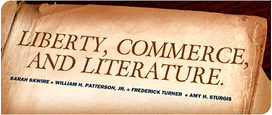A very interesting set of ideas, Fred.
I have this theory that there was a thriving new esthetic coming together, across art forms of all sorts, before World War I, but that collapse of the 19th century political framework provided such a traumatic shock that it’s taken most of the next hundred years to recover from it—and that some of the recent neoclassical movements in painting and in music (of which genre literatures as they “mainstream” themselves are a major part) are a moderately sophisticated attempt to pick up the pieces of that shattered esthetic, constituting a “jump around” the High Modernist movement(s). Robert Heinlein seems to have been saying something like this quite deliberately in Stranger In a Strange Land: his mini-lecture about how to look at a Rodin sculpture is a dead giveaway (Rodin was one of the principal figures in the evolving esthetic of “The Moderns”). Certainly science fiction has been mainstreaming itself for the last thirty years or more—a process that could not occur without the active cooperation of the general readership. And as Northrup Frye noted, the prestige forms of one era frequently rise out of the subliterary forms of prior eras.
Turner Replies: I love your idea about the new esthetic that was forming before WW1. Perhaps it was aborted by the sheer massacre of the young men at the Western Front who would have have brought it to fruition and given Europe a new lease of creative life. The ones that stayed behind and the traumatized survivors created Modernism instead. And the women, like Virginia Woolf, disillusioned with the male madness of the war, began to look in new directions altogether–but they had to win the right to a decent education first.
Skwire Replies: There’s a major boom in women’s fiction between the two wars, much of which is resolutely entrepreneurial in its focus. This isn’t surprising, given the tragic loss of educated professional men and the attendant increasing numbers of women in the workforce, but it’s an under explored area–probably because it’s often work thats from the unjustly maligned genre of the romance novel *and* because it’s material that is written by and for women. I recommend the publications from the English press Persephone Books–with a particularly enthusiastic plug for Dorothy Whipple’s novel, High Wages.

